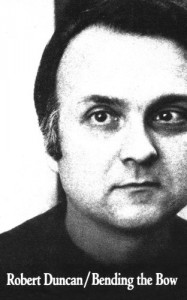I read.
“No,” it said, “READ.”
Read. Meaning, out loud?
“Yes. READ OUT LOUD.”
So I did, sitting in my car parked on a Berkeley sidewalk, I read Robert Duncan’s introduction to his book of poems, Bending the Bow, out loud. His words flowed out of my mouth. His thoughts on the Vietnam War, the reader, equilibration… elegant and moving. He wrote his work to be read, out loud.
I first came across Robert Duncan’s name when I was leafing through Jack Foley’s Visions and Affiliations, A California Literary Time Line Part I. Duncan called his poems “passages”. Recently Jack gave me Bending the Bow. “You have to read Duncan.” He said.
Duncan wants me to hear the music of his work. I looked out to the bright winter sky. Yellowing leaves scattered about by the order of the breeze . Duncan might be just outside my window tapping the rhythms with his fingers. Without a physical body he managed to speak through another’s mouth and lived again.


I used to visit Duncan’s partner, the great painter Jess, after Duncan’s death. We would have lunch and talk about all sorts of things. Jess was a brilliant, modest man whose brilliance would often manifest unexpectedly as he was speaking of something utterly everyday–eggs or the quality of the afternoon. (His brilliance is of course everywhere present in his paintings and collages.) One day, I said to Jess, “Robert is so alive in this house.” He said, pointing, “Yes, I keep thinking he might come through that door at any time.” That’s what I felt as I read what you wrote, Clara. If you are speaking someone’s words then in a sense you ARE that person. Ah, Clara, Duncan has claimed you. (In my dreams I have mentioned to him the beauty of your work. And, after all, you have put on his hat–the one that hangs in my house.)